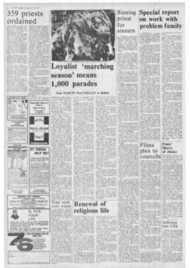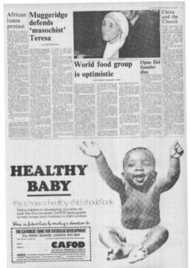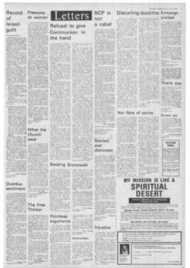Page 2, 4th July 1975
Page 2

Report an error
Noticed an error on this page?If you've noticed an error in this article please click here to report it.
Tags
Share
Related articles
Shaping Church Welfare Plans
Birth Control Stressed In Banned Book
Vatican Changes Mind On Banning Population Book
Plea For Positive
C Of E Launches Major Report On The Flaws And Strengths...
Special report on work with problem family
A REPORT by a priestpsychotherapist pointing out shortcomings in the social welfare services appears in a booklet published yesterday by the National Council of Social Service.
Fr Michael Ingram, OP, who is a professional social worker, described his work with an emotionally disturbed boy and his family at the Leicester Family Service Unit.
Almost 20 social services or officials had to be contacted and Fr Ingram observed: "Only a very inadequate family needs to have contact with so many people and only an adequate family would be able to cope with them."
The boy, aged nine, was one of a "multi-problem" family of seven. He had been deserted by the mother, his father was emotionally deprived after an upbringing in an orphanage and his two eldest sisters were living with former prisoners in the family home.
The youngster was terribly withdrawn, enuretic and illiterate. Violent rages alternated with a refusal to cooperate with anyone.
Handling the case required contact with the many areas into which social services are divided. Fr Ingram said: "They are in one office and you have been put through to another; they are on leave or sick. No one knows the case or has the authority to deal with it . .. the office is understaffed and there is a shortage of money."
Even a social worker can become reduced to an anxiety state and Fr Ingram said: "I remember clearly one time when I was so exasperated about not being able to deal with a matter I considered urgent that I had a conscious desire to go home and kick the cat."
In helping the boy, Fr Ingram spent up to 15 hours a week with him engaged on various activities, using a tape recorder to encourage him to talk and taking him on a holiday. He also became involved in the family's many problems from housing to supplementary benefit claims.
While praising "the courtesy and sympathy with which I was treated in every department", the system under which the welfare officials worked was "too cumbersome to deal with emergencies — three weeks apparently being the time needed in any department to attend to a matter."
Fr Ingram suggests certain services should be combined. But the complexity and inflexibility of the social services have deeper roots.
He said: "The ultimate decisions as regards action to be taken are often made by people who have no knowledge of social work, education authorities, social ad ministrators, housing officers: or if they have knowledge of social work, have no direct knowledge of the case or of the skills of the specialists who may be involved."
He added: "Action taken is often according to provisions available rather than according to need, the provision of facilities being made at the dic
tates of the city fathers, one of whose interests is political power, which means keeping down the rates."
There are 23 family service units, almost half of them in
London. They grew out of the
work of mainly Quaker pacifists during the last war, working to help bombed out families in the cities. The first unit being set up in 1947.
A registered charity, most of the FSUs' finance comes from central and local government grants and they work closely with the statutory social services.
Graham Murphy, organiser of the Leicester unit, said that while each unit was different, they generally aimed to work with families who had a lot of problems with which they could not cope.
The units hadmore freedom in the way they worked than
statutory social workers, and
could concentrate on particular projects. They tried to "ex amine and make public the cause of family breakdown" while having a commitment to social education, he said.
Fr Ingram, of Holy Cross Priory, Leicester, also helped prepare the book on population originally sponsored by the Conference of International Catholic Organisations, which the Vatican unsuccessfully attempted to ban in February. Two other Catholic nuns work with family service units in Glasgow and Edinburgh.
The Leicester FSU report with Fr Ingram's article, called
"Time to Consider" is 90p including postage from: Family Service Units, 207 Old Marylebone Road, London NW1 5QP.
blog comments powered by Disqus









